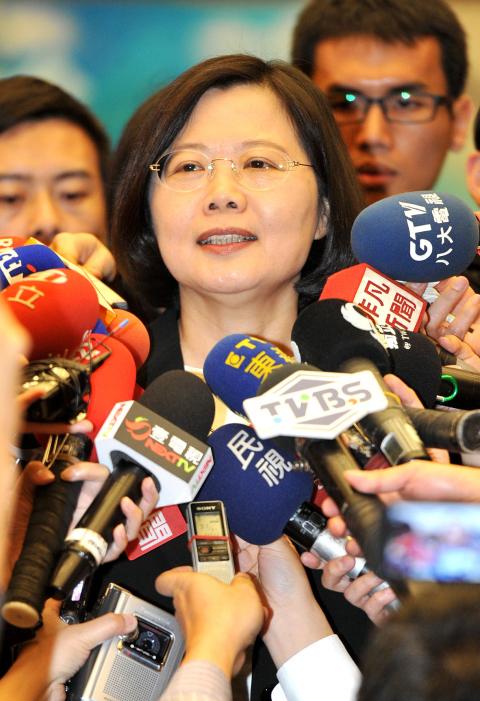Democratic Progressive Party (DPP) presidential hopeful Tsai Ing-wen (蔡英文) said yesterday she would not be responding to a media furor over her sexual orientation.
“There is nothing wrong with any gender, sexual orientation or marital status. Nobody has the right to question another [on this],” Tsai said in a short -300-word public statement.
Tsai said she would use the opportunity presented by the furor to promote awareness about discrimination, suggesting that an individual’s right to privacy concerning their sexual orientation was akin to a human rights issue. She said she would work to “eliminate gender discrimination in Taiwan.”

Photo: Chien Jung-fong, Taipei Times
“I will lead Taiwan as a country that respects human rights and is more accepting. I will also work to ensure that minority groups experience the same quality of life, happiness and respect on this piece of land as everyone else,” she added.
Former DPP chairman Shih Ming-teh (施明德) drew criticism on Thursday after he called on Tsai, who is single, to clarify her sexual orientation, saying that voters needed a “clear answer” before voting for her next year.
“She needs to be true to herself, her body, in order to be true to her beliefs and her country,” Shih said.
Lawmakers across party lines, as well as gay rights and feminist groups, have come to Tsai’s defense over the past two days, saying that it is irrelevant for the presidential hopeful to disclose such personal details.
The Taiwan Women’s Link on Friday called on Shih to either explain the relevancy of his remarks or “apologize to all single women, gays and female politicians.”
Tsai’s competitors in the DPP primaries also said they did not believe a candidate should be questioned on their sexual orientation.
“Taiwan cannot be like this and politics should not be like this. I do not think that it’s a good idea,” Su Tseng-chang (蘇貞昌) told reporters yesterday.
Hsu Hsin-liang (許信良) said he was “astonished” by Shih’s questions, which he called a violation of Tsai’s privacy.
In the statement, Tsai said she would “definitely not” respond to a line of questioning she characterized as “surprising” — considering Shih’s past work in Taiwan’s democracy and human rights movement.
“Because if I did, it would amount to recognizing his right to question anybody [on the issue],” Tsai said.
Asked whether she felt angered by the remarks at a later setting, she said she “wasn’t angry, did not care and did not plan to respond on the issue any further.”
Tsai, who has temporairily stepped down as DPP chairperson, has not been linked to anybody romantically in the past decade she has been a public figure.
The questions come at a sensitive time for her, with two weeks left before the telephone polls used to settle the primaries between April 25 and 29.

DAREDEVIL: Honnold said it had always been a dream of his to climb Taipei 101, while a Netflix producer said the skyscraper was ‘a real icon of this country’ US climber Alex Honnold yesterday took on Taiwan’s tallest building, becoming the first person to scale Taipei 101 without a rope, harness or safety net. Hundreds of spectators gathered at the base of the 101-story skyscraper to watch Honnold, 40, embark on his daredevil feat, which was also broadcast live on Netflix. Dressed in a red T-shirt and yellow custom-made climbing shoes, Honnold swiftly moved up the southeast face of the glass and steel building. At one point, he stepped onto a platform midway up to wave down at fans and onlookers who were taking photos. People watching from inside

A Vietnamese migrant worker yesterday won NT$12 million (US$379,627) on a Lunar New Year scratch card in Kaohsiung as part of Taiwan Lottery Co’s (台灣彩券) “NT$12 Million Grand Fortune” (1200萬大吉利) game. The man was the first top-prize winner of the new game launched on Jan. 6 to mark the Lunar New Year. Three Vietnamese migrant workers visited a Taiwan Lottery shop on Xinyue Street in Kaohsiung’s Gangshan District (崗山), a store representative said. The player bought multiple tickets and, after winning nothing, held the final lottery ticket in one hand and rubbed the store’s statue of the Maitreya Buddha’s belly with the other,

Japan’s strategic alliance with the US would collapse if Tokyo were to turn away from a conflict in Taiwan, Japanese Prime Minister Sanae Takaichi said yesterday, but distanced herself from previous comments that suggested a possible military response in such an event. Takaichi expressed her latest views on a nationally broadcast TV program late on Monday, where an opposition party leader criticized her for igniting tensions with China with the earlier remarks. Ties between Japan and China have sunk to the worst level in years after Takaichi said in November that a hypothetical Chinese attack on Taiwan could bring about a Japanese

‘COMMITTED TO DETERRENCE’: Washington would stand by its allies, but it can only help as much as countries help themselves, Raymond Greene said The US is committed to deterrence in the first island chain, but it should not bear the burden alone, as “freedom is not free,” American Institute in Taiwan Director Raymond Greene said in a speech at the Institute for National Defense and Security Research’s “Strengthening Resilience: Defense as the Engine of Development” seminar in Taipei yesterday. In the speech, titled “Investing Together and a Secure and Prosperous Future,” Greene highlighted the contributions of US President Donald Trump’s administration to Taiwan’s defense efforts, including the establishment of supply chains for drones and autonomous systems, offers of security assistance and the expansion of